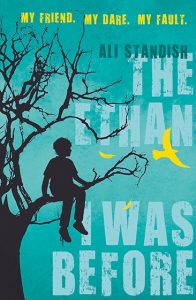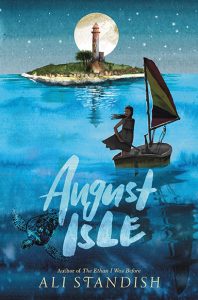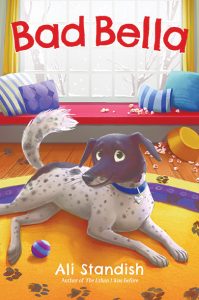 A storyteller from childhood and now an all-grown-up author, Ali Standish ’10 is writing children’s and middle-grade books that are being noticed by children and critics alike.
A storyteller from childhood and now an all-grown-up author, Ali Standish ’10 is writing children’s and middle-grade books that are being noticed by children and critics alike.
Her first book, The Ethan I Was Before, received a coveted starred review from Publishers Weekly: “Readers will be riveted.” Her debut was an award-winner, racking up accolades like the Children’s Book Review Best Book of the Year and the North Carolina Young People’s Literature Award, and landed on a slew of long-lists, including being named a Carnegie Medal Longlist Title.
August Isle, Standish’s second book published by HarperCollins, was released in April and is a work with themes of secrets and lies. A Junior Library Guild Selection, it was praised by Kirkus Reviews as “a beautifully written story. An emotional journey of family, friendship, loss, and healing.”
 Pomona College Magazine’s Sneha Abraham talked to Standish about inspiration, imagination, what’s an absolute must in children’s literature and more.
Pomona College Magazine’s Sneha Abraham talked to Standish about inspiration, imagination, what’s an absolute must in children’s literature and more.
PCM: So, why writing? What led you down this path?
Standish: You know, it’s hard to say that I chose writing. This sounds very cliché, but I think writing more so chose me, or at least storytelling did. A lot of my earliest memories are of making up stories about things. And from when I was really little, my mom and I would play storytelling games. So it’s always been something that I needed to do as a creative outlet. I wrote my first manuscript when I was in the sixth grade and have been writing ever since. When I was at Pomona, I was fortunate to be able to take some creative writing classes with [poet and former Pomona College Professor of English] Claudia Rankine, and it was wonderful. I also was able to do creative writing as part of my study-abroad curriculum in Cambridge.
 I’ve just been doing it for really as long as I can remember. Then one of my really good friends, an important person in my life, passed away in fall of my senior year. And a big part of coping with that for me was writing my first children’s lit manuscript. I wrote a manuscript that was a very boilerplate, poorly written fantasy novel. And I was able to submit that as my final project for Children’s Literature 101. So senior year was when I really edged over into writing children’s literature.
I’ve just been doing it for really as long as I can remember. Then one of my really good friends, an important person in my life, passed away in fall of my senior year. And a big part of coping with that for me was writing my first children’s lit manuscript. I wrote a manuscript that was a very boilerplate, poorly written fantasy novel. And I was able to submit that as my final project for Children’s Literature 101. So senior year was when I really edged over into writing children’s literature.
PCM: Talk about why you moved into children’s literature.
Standish: Astrid Lindgren, who is the author of the Pippi Longstocking series, has this great quote about how she only wants to write for children because children are the only ones who can perform miracles when they read. That quote really resonates with me because I just have such powerful memories of being a reader as a child. And what a sacred experience that was for me and a formative experience. To be a part of creating that for another generation of children, I think, is probably the most rewarding thing that I can imagine doing.
PCM: Where do you get your ideas from?
Standish: I think every book that I’ve written so far has started with a kernel from my own life experience. With The Ethan I was Before, that book really started with the grief that I felt after losing the best friend that I mentioned earlier. With August Isle, it started with a trip to Indiana for a family funeral where I was reminded of a family secret that stoked some curiosity for me, and that I thought could potentially make a good book. Then with Bad Bella, that book is actually based on my own dog, Bella. The one I have coming out in the winter, called How to Disappear Completely, is actually about a girl who gets vitiligo, which is a condition that my husband was diagnosed with a couple of years ago.
It always starts with something from my life experience. Then it becomes a process of finding enough other inspiration in the world around me to take that seed of truth and turn it into a story that is not my story, that is something new and exciting. I was just working on my launch-party speech for August Isle, and I was comparing it to being a kid hunting for Easter eggs. It’s always that hunt of keeping your eyes out wherever you go and waiting for those interesting people to cross your path, or a news article that has something in it that you are drawn to.
And then once you have those different kinds of sources of inspiration, it’s pulling them together and trying to find the connections between them. Because I think how you make the connections between the different elements of your story is how you make your story unique. There’s no subject that hasn’t been written about; it’s how you write about it and what you connect it to that makes it interesting. So that’s the part of the process that really is my favorite part, that gets my neurons really firing—thinking about how to bring things together in a new way.
PCM: How do you feed your imagination? You’re looking for new ways of telling things. What do you do to stoke that fire?
Standish: I read—that’s the main thing. And then I have an overactive imagination. The positive manifestation of that is that I am quite easily able to take someone passing me on the street and create a story around them. The downside is that I have a lot of anxiety in things, and I think that is also a product of imagining different scenarios. Let’s see. I travel whenever I can. That is really helpful. In August Isle, there’s a character who is an old and wizened seafarer who has just come back from a long journey around the world. Being able to rely on what I’ve learned from being in different places is really helpful in that, and it’s cool to be able to introduce those places and different concepts to young readers.
PCM: What’s your favorite book or books from your childhood?
Standish: The two that I always go back to are Bridge to Terabithia by Katherine Paterson and The Lion, the Witch and the Wardrobe by C. S. Lewis. I read both of those books in fifth grade, which was a really transformative and transitional year for me. They are interesting counterparts to one another because they’re both about children who find magic worlds. And in one they stumble into Narnia. But in Bridge to Terabithia they create that world for themselves. That idea really intrigued me. I lived in kind of a rural place that had a little forest in the backyard, and I just decided that my backyard was going to be my magical kingdom and called it “Nabithia,” because I hadn’t learned a lot about originality at that point. I just took Narnia and Terabithia and stuck them together, and I brought that into our playing make-believe. I kept a diary in the hollow of a tree, where I would write down these different episodes that I created for myself. And that was a really foundational experience for me in learning how far I could stretch my imagination and what I could do with it.
PCM: Nature plays a big role in your writing. Can you talk a little bit about that?
Standish: Yes. I wrote The Ethan I Was Before after my husband and I moved to England. I didn’t know anybody. I had no job prospects. I was very isolated. And I was really homesick and particularly homesick for the American South. So writing the setting for The Ethan I Was Before—writing that town of Pam Knot, Georgia—was a way for me to reconnect with a place that I really missed.
Nature played a huge part in my imaginative journey. And I think we continue to learn about how important nature is in terms of development, in terms of mental health. I was just reading an article in The New York Times yesterday written by Oliver Sacks about the importance of gardens in helping patients that have neurological issues. Unfortunately, because of the way that society has moved, it’s harder and harder for kids to have meaningful interactions with nature on their own. So I think it’s more important that they get that through books. If they’re not getting it anywhere else, at least they can have it on a page.
PCM: Narnia is outdoors. You’ve been inspired by that.
Standish: Yeah. You think about spaces like the Forbidden Forest in Harry Potter and how alluring that is. And even going back to fairy tales, we have a fascination with forests and the secrets that can be found there. Een in an age where children don’t play outside as much, I think that fascination is very much in our DNA.
PCM: Something primal about it.
Standish: Yes, yes. And I also think it’s important for kids to develop a healthy appreciation of our Earth and to know how important it is to safeguard it. This is kind of off-topic, but I think we’re coming to a point where we know that this generation is going to be the one who’s either going to really create change and be able to be the ones who are going to force everybody else to save the planet, or they’re not. I think having that emphasis there and that exposure early on is vitally important.
PCM: What elements do you think a children’s or middle-grade book has to have to tell a story successfully?
Standish: I think the biggest thing is honesty. Kids that age are … they’re coming into themselves. They’re already looking back on their childhood with the sense of nostalgia but also suspicion. Because for most of them, if they’ve had healthy upbringings, they have been isolated and insulated from a lot of the harsher realities of life. And they’re really curious about those things. So my books tend to have heavier subject matter in them. Adults come up to me all the time and say, “Do you really think an eight-year-old or 10-year-old wants to read about this?” And my answer is emphatically, “Yes, they do,” because books are a safe place to learn about those kinds of topics, so what better place to introduce them.
Adventure is always going to be key for middle graders because as much as they may be growing up socially, I think a lot of them are still holding on to that quest kind of structure that they have probably read in The Lion, the Witch and the Wardrobe and Harry Potter and books like that. So I always try to mix issues that can be hard to talk about with a sense of adventure and humor and sometimes a little bit of magic that helps to lighten up that heavier stuff.
PCM: Kids can deal with more than we give them credit for.
Standish: Exactly. And, you know, they do with the internet and social media, the way they are; they’re always dealing with more than we know that they are.
PCM: How do you think your Pomona education contributed to your taking this literary path?
Standish: Pomona gave me everything that I needed to be able to take this path. Part of it was just being around so many people who were passionate about whatever it was they were doing. Even if it was something that didn’t seem like it could translate easily into a lucrative career path. And people who were unashamed about what they were passionate about. That made me feel like it was a safe place to explore my passions and to not put myself down for having an idea that I might one day be able to write professionally. I got a lot of encouragement from the faculty there in terms of my writing. I also got an occasional kick in the pants that I really needed.
My advisor was [Professor] Toni Clark, who passed away a couple of years ago. I will never forget the first class I took with her; I wrote an essay on Virginia Woolf’s To the Lighthouse, where I looked at bird imagery. I typed it up and sent it off to her, and she gave me a C-minus. I was devastated and horrified. That was early on in my career at Pomona. I had a sense that it was confirming everything that my impostor syndrome had told me about—not being worthy of a Pomona education.
When I went in to see her to ask her what I could do better and to plead the case for extra credit, she told me that she had given me that grade because she knew from my contributions in class that I could do much better. And if I were another student, she might have given me a different grade, but she knew that I had it in me to do more and she wanted to pull that out of me. I am so thankful that she did that, because even though it was just a little paper and a small moment, it really made the difference in how I—I’m about to cry about it—it really made a difference in how I saw myself and my potential. That was a message that I didn’t get a lot in high school. Pomona gave me a lot of emotional and intellectual tools to be able to pursue this career path.
PCM: It’s touching to have someone see more in you than you see in yourself.
Standish: Exactly. And for a girl who came from Greensboro, North Carolina, to Pomona—my guidance counselor cried when I told her I got into Pomona. She said, “I don’t believe it.” So, when I came, I really was not sure if it was something that I could handle or a place that I belong. So especially for me to have that reassurance was really powerful.
PCM: What are you reading right now?
Standish: I am reading … nothing that’s going to look good, in fact. I would love to say I’m reading Tall Story. But no, I am reading an audio book by an Australian author I love called Liane Moriarty. She did Big Little Lies, which got turned into that HBO series. And then I’m reading a British mystery.
But I will say that’s not my usual fare. Usually my bedside table is stacked high with 10, 12-odd children’s books that I’m reading.
PCM: Do you alternate between children’s books and adult books? Or do you have a method of how you choose your books?
Standish: I try to. It’s important for me to see what’s out there in children’s books. Every time I open a book, I treat it as a learning experience. I always feel like I come away having learned something new about the craft of writing, whether it’s what to do or what not to do. Then when I need a break from children’s books, generally I tend toward hedonistic pleasures in the adult books. I go straight for the mysteries and The New York Times bestsellers.
PCM: Great. No shame in that.
Standish: Yeah, thank you.
PCM: No, no.
Standish: The English major in me does die a little inside.
